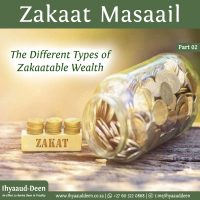
Passing away with the Sunnah during the Pandemic
The religion of Islam is the greatest favor of Allah Ta‘ala to mankind. Islam can be compared to a green and lush orchard with all types of fruit bearing trees, fragrant flowers and beneficial plants. Wherever a person walks in this orchard, he will find something delicious to relish, something to give him shade and comfort from the heat, something to appease his eye and something fragrant to satisfy his soul. The only condition to benefit from this beautiful, flourishing, green and lush orchard is that one enters it and opens his heart to the goodness contained in it.
Just as the goodness of such an orchard can only be acquired through entering it and opening the heart to its goodness, similarly the immense blessings and goodness of Islam can only be acquired through one entering Islam and opening his heart entirely towards the goodness contained in it.
In the Qur’aan Majeed, Allah Ta‘ala says, “O you who believe! Enter into peace (Islam) in totality.” (Surah Baqarah v. 208) In this verse, Allah Ta‘ala refers to Islam as peace, indicating that Islam is the only source of true peace in the world. When a person upholds the value system of Islam in his life and shares the goodness of Islam with others, then peace and happiness will prevail in his environment. Accordingly, if all the Muslims of the world advocate and promote Islamic values wherever they live, then peace and happiness will rein in the entire world. This peace and happiness will not only be enjoyed by Muslims – rather even the kuffaar will experience the peace and goodness of Islam.
In Islam, there are innumerable avenues through which one can earn entry into Jannah. Through fulfilling the rights we owe to Allah Ta‘ala such as salaah, zakaah, fasting and haj, we will be able to gain entry into Jannah. Similarly, through fulfilling the rights we owe to the creation, such as upholding the rights of parents, family members and neighbors, as well as spending on the poor, destitute and orphans, we will be able to gain admission into Jannah.
In fact, Islam is so unique that it even shows us the way to acquire goodness after leaving the world, and even the way to benefit others in the Hereafter after leaving the world.
Among the many avenues of acquiring goodness after leaving the world as well as benefiting others in the Hereafter is passing away as a shaheed (martyr). When Allah Ta‘ala wishes to bless a person with a lofty rank in the Hereafter, then Allah Ta’ala blesses him with the rank of martyrdom. The martyr enjoys such exclusive privileges that all his sins are forgiven, he is saved from the punishment of the grave, he earns great rewards and a lofty rank in the Hereafter and is blessed with the honor of taking seventy people to Jannah.
Just as passing away on the battlefield is the main cause for attaining martyrdom, Allah Ta‘ala, through His infinite grace and mercy, has blessed this ummah with other causes through which they may attain the rank of a martyr. Among the many causes reported in the Hadith for earning the rank of a martyr is passing away in a plague (epidemic or pandemic).
It is reported in the Hadith that the one who passes away in a plague, passes away as a shaheed and all his sins are forgiven. Similarly, it is reported that the one who dies a natural death during a plague also receives the rank of a martyr, on condition that he does not flee from the plague and is pleased with the decree of Allah Ta‘ala. (Saheeh Bukhaari #3474)
However, it should be borne in mind that the primary condition for earning the rank of a shaheed through passing away in an epidemic is to be pleased with the decree of Allah Ta‘ala.
When the plague of Amwaas struck Shaam during the khilaafah of Hazrat Umar (radhiyallahu ‘anhu), the leader of the Muslims in Syria, Hazrat Abu Ubaidah (radhiyallahu ‘anhu), delivered the following sermon, “O People! This plague is a mercy for you! It is the dua of your Nabi (sallallahu ‘alaihi wasallam) and it was the means of pious people passing away before you! Indeed Abu Ubaidah has made dua to Allah Ta‘ala to grant him a share of this plague.”
Hazrat Abu Ubaidah (radhiyallahu ‘anhu) thereafter became afflicted with the plague and passed away, leaving Hazrat Mu’aaz bin Jabal (radhiyallahu ‘anhu) as his successor. Hazrat Mu’aaz bin Jabal (radhiyallahu ‘anhu) thereafter addressed the people saying, “O People! This plague is a mercy for you! It is the dua of your Nabi (sallallahu ‘alaihi wasallam) and it was the means of pious people passing away before you! Indeed Mu’aaz makes dua to Allah Ta‘ala to grant his family a share of the plague.”
It is reported that when Hazrat Mu’aaz (radhiyallahu ‘anhu) returned from the musjid, he found that his son was afflicted by the plague. He continued to nurse him until he passed away. It was not long thereafter that Hazrat Mu’aaz (radhiyallahu ‘anhu) noticed the sores appear on his hand, which were the symptoms of the plague. Out of joy and happiness, he began gazing at his hand and said, “I am not prepared to bargain this for all the treasures of the world!’” Thereafter, Hazrat Mu’aaz (radhiyallahu ‘anhu) also departed from this world. (Kashful Astaar #3042, Bidaayah wan Nihaayah 10/43)
From the above, we see how the Sahaabah (radhiyallahu ‘anhum) reacted to the plague. They were extremely happy with the decree of Allah Ta‘ala and knew that this was a means of them gaining the special mercy of Allah Ta‘ala and the lofty rank of martyrdom in the Hereafter. Furthermore, they continued to attend the Musjid for salaah as well as take care of the sick among them.
Six Important Points for those Afflicted by the Pandemic or any Difficulty
Hazrat Thaanwi (rahimahullah) mentioned the following six points for those who are afflicted with any difficulty.
- One should exercise sabr (patience) at the time of the difficulty. Exercising patience in the face of difficulty is the sign of a true believer. Rasulullah (sallallahu ‘alaihi wasallam) said, “If prosperity and favorable conditions prevail over a believer, he expresses gratitude, and this is good for him, and if adversity and unfavorable conditions befall him, he adopts sabr (patience), and this is good for him.” (Saheeh Muslim #2999)
- One should not become despondent and lose hope in the mercy of Allah Ta‘ala. Rather, one should continue to hope for the mercy of Allah Ta‘ala, and remember that the power and grace of Allah Ta‘ala is above all worldly means. Only a kaafir loses hope on account of him not believing in taqdeer. People of true Imaan never lose hope and are always pleased with the decree of Allah Ta‘ala.
- One should not allow the difficulty to cause him to become negligent in fulfilling his deeni obligations which he owes to Allah Ta‘ala (e.g. attending the salaah in the musjid and performing salaah in the normal manner, etc.) or the creation (e.g. visiting the sick and taking care of them, participating in the janaazah salaah and burial in the case where they pass away, etc.).
- One should continue to make du‘a to Allah Ta‘ala and adopt the means to remove the problem (e.g. taking medication). However, one should not place his reliance on the means, but should place his reliance upon Allah Ta‘ala alone. Through turning to Allah Ta‘ala in du‘a, Allah Ta‘ala will place barakah in the means and cause the desired effect to materialize.
- One should continuously engage in istighfaar and beg Allah Ta‘ala to forgive his sins.
- If a calamity has afflicted any of one’s Muslim brothers, then one should regard his brother’s difficulty as his own difficulty. Hence, he should make du‘a for him, and if he is able to assist him, then he should adopt the same means in assisting him that he would have adopted to remove his own difficulty. (Rasulullah (sallallahu ‘alaihi wasallam) said, “None of you has true Imaan until he loves for his brother what he loves for himself).” (Saheeh Bukhaari #13)
(Malfoozaat Hakeemul Ummat 23/174)
We make dua that Allah Ta‘ala grant the ummah the true understanding of deen, bless us with the tawfeeq of upholding the sunnah of Rasulullah (sallallahu ‘alaihi wasallam) and treading in the footsteps of the Sahaabah (radhiyallahu ‘anhum) in all facets of our lives.
 Ihyaaud Deen An Effort to Revive Deen in Totality
Ihyaaud Deen An Effort to Revive Deen in Totality



